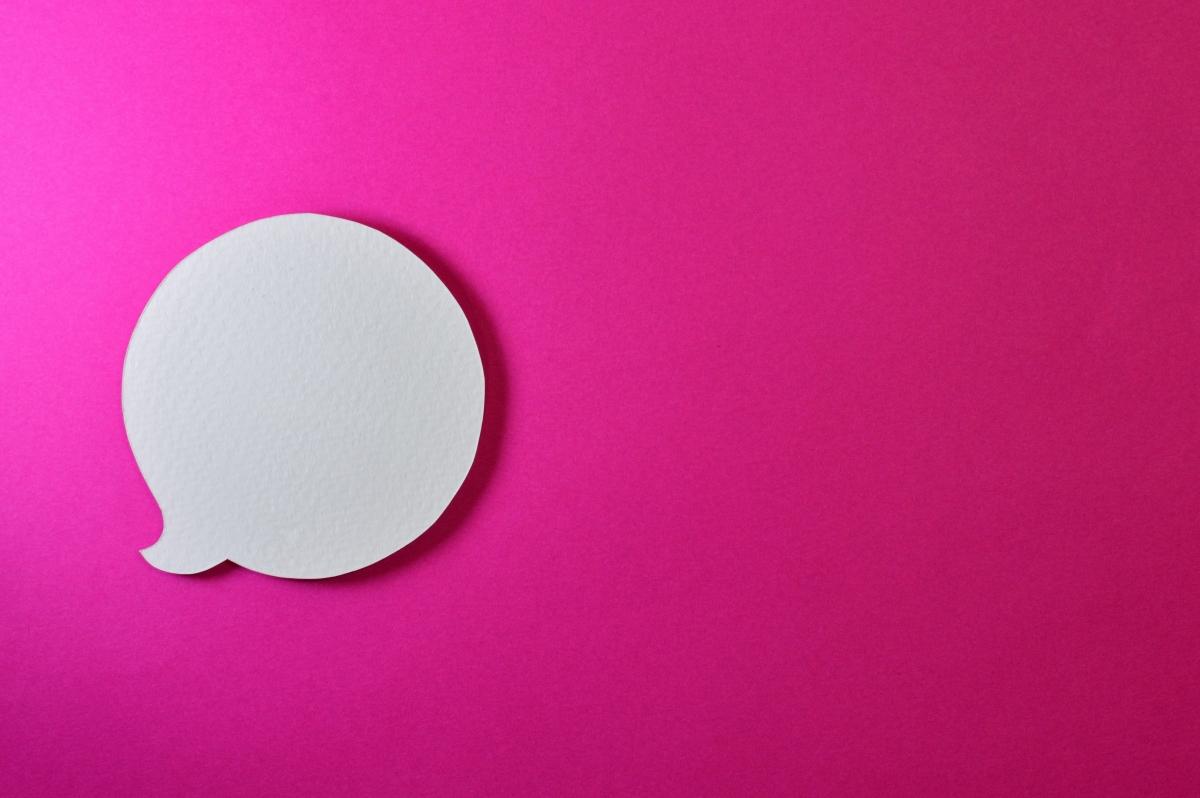From derogation to reclamation: How does language change?
Derogatory labels are offensive words that can be reclaimed by a stigmatized group; however, the process of reclaiming can carry risks.
In 2020, Black Lives Matter (BLM) protests took place around the world, reminding us about social inequalities and racism. Through these protests, we became particularly attentive to the language and labels we use. On July 29th, BBC News aired a news report where the N-word was used. Thousands of complaints from viewers followed[i]. After an initial defense of the news report, the BBC director apologized and recognized the distress the N-word had caused to the audience. In the same month, a YouTube video showed a White BLM supporter using the N-word and being educated about it by Black people[ii]. Part of the White BLM supporter’s argument for using the N-word was that Black people, and specifically Black rappers, use it themselves. Instances in which Black people use the N-word to label themselves are referred to as episodes of ‘reclaiming’. This use of derogatory labels by stigmatized people is often meant to be an action to ‘take the power back’ and transform offensive terms into neutral ones. Still, reclaiming is a risky process, given that may be perceived as non-offensive and empowering only under certain conditions. Hence, the debate on when such derogatory labels are used in a reclaimed fashion, and by whom, is still open[iii].
Language change: What does “reclaiming” mean?
Our language changes all the time: some words fall out of favor, while new ones get introduced. Additionally, some words take on new meanings. Such change is strictly connected with social language use. Particularly important are those labels that categorize individuals as members of social groups. Group labels are powerful tools as they categorize individuals with connotative meanings that convey social information and define group relations[iv]. We can distinguish group labels through the use of category labels, which are neutral terms, like “gay”, that define a group, and derogatory labels, highly offensive terms that convey negative attitudes toward a specific minority group, like “f****t”[v]. Derogatory labels represent expressions of prejudice that elicit negative evaluations, dehumanizationxi xii [vi], and discrimination of the target group and its members[vii]. As socially-constructed terms, derogatory labels are malleable and their meanings are context-dependent. This implies that derogatory labels used by a majority group to highlight their power and marginalize minority group members, can change meaning and be used to deconstruct power-relationships.
Linguistic reclamation is the process of taking possession of a derogatory label – usually introduced by a dominant group – by stigmatized group members. This process implies that the stigmatized group members consciously use it to label themselves, thereby turning a hurtful term into a badge of pride. This is what Richard Pryor did when using the N-word in his stand-up comedy, or what happens when Black people use variations of the N-word. Other examples come from music. In 1997, Meredith Brooks proclaimed, “I am a bitch,” in the lyrics of her song[viii]. More recently, Madonna called herself a “bitch” 44 times in her Rebel Heart album[ix]. Outside the music industry, sexist labels have been used to name various women’s movements (e.g., the SlutWalk)[x]. Historically, we have examples of almost fully reclaimed derogatory labels. The most famous case is the word ‘queer’. In the ‘80s, ‘queer’ was a derogatory label against gay men, but this term is nowadays often used in a reclaimed fashion by the LGBT community[xi].
But how does reclaiming happen? According to Galinsky and colleagues[xii], reclaiming consists of two distinct processes: reframing and reappropriation. Reframing involves the rejection of the pejorative meaning attached to a derogatory label followed by conceptualizing it in positive terms. Hence, reframing addresses the aim of value reversal (from negative to positive valence). Re-appropriation occurs when a stigmatized group makes the derogatory label its own and, by doing so, empowers the group through its use. According to Galinsky and colleagues’ (2003) theoretical model, reclamation happens through different steps: from a lone individual who uses a derogatory label to a societal recognition of the label in a new neutral meaning. Reaching societal recognition of reclaiming is not easy. It is therefore fundamental to understand how the first step involving self-labelling happens.
What does research tell us about reclaiming?
Galinsky and colleagues experimentally examined the predictors and consequences of self-labelling with a derogatory label xiii. They investigated whether self-labelling could reduce the label stigmatizing force and at least reassess its revalue, where words that were designed to derogate were changed into statements of self-respect. In doing so, they focused on the central role of power involved in self-labelling process. First, they tested what motivates minority group members had to self-label with a derogatory label. Participants were asked to recall derogatory labels commonly used toward their group and, depending on the condition, to remember a time in which their group was either powerful or powerless. Next, they reported their likelihood to self-label with the mentioned derogatory labels. Remembering group power increased the chances of self-labelling. Additional experiments showed that it was the ‘group power’ (i.e., empowerment of the stigmatized group) rather than the ‘individual power’ (i.e., empowerment of the single individual) that increased the likelihood of self-labeling. Moreover, other studies suggested that the act of self-labelling elicited feelings of power and being in control.
To be effective, reclaiming needs to be perceived as empowering not only by those who self-label but also by those who observe such act. Research suggests that this is usually the case. Participants who observed individuals who self-labeled themselves with a derogatory label perceived those individuals as more powerful than when the target was labeled in that way by a majority group member. [xiii] But does self-labelling lead to reframing? Findings showed that an individual self-labeling with a derogatory label felt was perceived as more powerful and, in turn, lead participants to view the label as less offensive.xiii
Is reclaiming risky?
So far, we have seen that derogatory labels can be reclaimed, and self-labeling users can be seen as empowered. But is this always the case? No. First, not all labels are the same. Derogatory labels vary in how they are perceived, with some being less offensive than others[xiv]. This is crucial as people may be more reluctant to see the N-word or the F-word in a manner that is not perceived to be offensive xii, but may see other labels as less pejorative if used in a self-labeling fashionxv. Second, it depends on who engages in reclamation. Galinsky et al.’s work showed that reclaiming happens when self-labelling is involved. However, reclaiming may also occur when stigmatized group members used derogatory labels among each other and when bystanders can draw information about the non-derogatory motives[xv]. Stigmatized group members tend to use derogatory labels among each other to enhance affiliation, identification[xvi], and express bonding[xvii] [xviii] xiv. A recent study showed that group membership matters, where the F-word was perceived to be less offensive when used by a man who was assumed to be gay rather than straight[xix]. At the same time, self-labeling induced the label to be perceived as less offensive. Hence, the act of self-labeling as well as who uses the label both play a role in whether the label is perceived as reframed.
Can majority group members use derogatory labels in a reclaimed fashion? Racial labels used by White individuals can be perceived as less offensive if the user and target are friends, especially if the label is not among the most offensive ones. This seems to be explained by the fact that, when used among friends, the motives behind the derogatory label use is seen as not prejudice and hence the label loses its pejorative connotation xvii [xx]. This said, even when used among friends, such label use needs careful consideration, especially if used in public. This was the case witha White woman who was invited on the stage to sing along with Black rapper Kendrick Lamar. She sang the N-word that was part of the song lyrics. The rapper stopped her and told her not use the word as she was not Black, followed by the audience booing [xxi]. We can assume the woman’s intents were not prejudicial. Still, she may not have considered the possible reactions as happened in the BCC news report case.
Conclusions
The use of derogatory labels by majority groups usually aims to derogate and reinforce the target group’s disempowered state[xxii]. However, reclaiming, and self-labelling in particular, has the ability to deprive the majority group members of a linguistic hurtful weapon. However, it is not as simple as it may appear. Several contextual factors, such as the label that is used, the social environment you are in, who uses the label, and the relationship between the label user and the target can affect how the label is perceived and the reactions it elicits. Reclaiming can be risky. We should consider that when we decide what label to use, especially if we use it toward others and not ourselves.
[i] BBC News (2020, August 6). BBC receives 18,600 complaints over use of racial slur in news report. https://www.bbc.co.uk/news/entertainment-arts-53676557
[iii] Kennedy, R. L. (1999). Who can say" nigger"? And other considerations. The Journal of Blacks in Higher Education, 26, 86-96. https://www.jstor.org/stable/2999172
[iv] Bianchi, M., Carnaghi, A., & Shamloo, S. E. (2018). Intergroup attitudes accessibility and motor approach-avoidance responses in White and Black individuals in Portugal. Psicologia Sociale, 13(2), 147-164. https://www.rivisteweb.it/doi/10.1482/90780
[v] Fasoli, F., Paladino, M. P., Carnaghi, A., Jetten, J., Bastian, B., & Bain, P. G. (2016). Not “just words”: Exposure to homophobic epithets leads to dehumanizing and physical distancing from gay men. European Journal of Social Psychology, 46(2), 237-248. http://dx.doi.org/10.1002/ejsp.2148
[vi] Greenberg, J., & Pyszczynski, T. (1985). The effect of an overheard ethnic slur on evaluations of the target: How to spread a social disease. Journal of Experimental Social Psychology, 21(1), 61-72. https://doi.org/10.1016/0022-1031(85)90006-X
[vii] Fasoli, F., Maass, A., & Carnaghi, A. (2015). Labelling and discrimination: Do homophobic epithets undermine fair distribution of resources?. British Journal of Social Psychology, 54(2), 383-393. https://doi.org/10.1111/bjso.12090
[viii] Bitch (Meredith Brooks song). (2020, February 15). In Wikipedia.https://en.wikipedia.org/wiki/Bitch_(Meredith_Brooks_song)
[ix] Nunn, G. (2015, October 30). Reclaiming words can be such a bitch. The Guardian. https://www.theguardian.com/media/mind-your-language/2015/oct/30/power-grab-reclaiming-words-can-be-such-a-bitch
[x] Gaucher, D., Hunt, B., & Sinclair, L. (2015). Can pejorative terms ever lead to positive social consequences? The case of SlutWalk. Language Sciences, 52, 121-130. https://doi.org/10.1016/j.langsci.2015.03.005
[xi] Zosky, D. L., & Alberts, R. (2016). What’s in a name? Exploring use of the word queer as a term of identification within the college-aged LGBT community. Journal of Human Behavior in the Social Environment, 26(7-8), 597-607. https://doi.org/10.1080/10911359.2016.1238803
[xii] Galinsky, A. D., Hugenberg, K., Groom, C., & Bodenhausen, G. (2003). The reappropriation of stigmatizing labels: Implications for social identity. In Polzer, J. (Ed), Identity Issues in Groups: Research on managing groups and teams (Vol. 5, pp. 221-256). Emerald Group Publishing Limited.
[xiii] Galinsky, A. D., Wang, C. S., Whitson, J. A., Anicich, E. M., Hugenberg, K., & Bodenhausen, G. V. (2013). The reappropriation of stigmatizing labels: The reciprocal relationship between power and self-labeling. Psychological Science, 24(10), 2020-2029. https://doi.org/10.1177/0956797613482943
[xiv] O'dea, C. J., Miller, S. S., Andres, E. B., Ray, M. H., Till, D. F., & Saucier, D. A. (2015). Out of bounds: Factors affecting the perceived offensiveness of racial slurs. Language Sciences, 52, 155-164. https://doi.org/10.1016/j.langsci.2014.09.005
[xv] Gibson, J. L., Epstein, L., & Magarian, G. P. (2020). Taming Uncivil Discourse. Political Psychology, 41, 383-401. https://doi.org/10.1111/pops.12626
[xvi] Whitson, J., Anicich, E. M., Wang, C. S., & Galinsky, A. D. (2017). Navigating stigma and group conflict: Group identification as a cause and consequence of self‐labeling. Negotiation and Conflict Management Research, 10(2), 88-106. https://doi.org/10.1111/ncmr.12094
[xvii] Bianchi, C. (2014). Slurs and appropriation: An echoic account. Journal of Pragmatics, 66, 35-44. https://doi.org/10.1016/j.pragma.2014.02.009
[xviii] Croom, A. M. (2011). Slurs. Language Sciences, 33(3), 343-358. https://doi.org/10.1016/j.langsci.2010.11.005
[xix] Fasoli, F., Hegarty, P., & Carnaghi, A. (2019). Sounding gay, speaking as a “fag”: Auditory gaydar and the perception of reclaimed homophobic language. Journal of Language and Social Psychology, 38(5-6), 798-808. https://doi.org/10.1177%2F0261927X19852753
[xx] Bianchi, M., Carnaghi, A., Piccoli, V., Stragà, M., & Zotti, D. (2019). On the descriptive and expressive function of derogatory group labels: An experimental test. Journal of Language and Social Psychology, 38(5-6), 756-772. https://doi.org/10.1177%2F0261927X19867739
[xxi] BBC News (2018, May 22). Kendrick Lamar stops white fan using N-word on stage at concert.
https://www.bbc.co.uk/news/newsbeat-44209141
[xxii] Mullen, B., & Johnson, C. (1993). Cognitive representation in ethnophaulisms as a function of group size: The phenomenology of being in a group. Personality and Social Psychology Bulletin, 19(3), 296-304. https://doi.org/10.1177%2F0146167293193006



